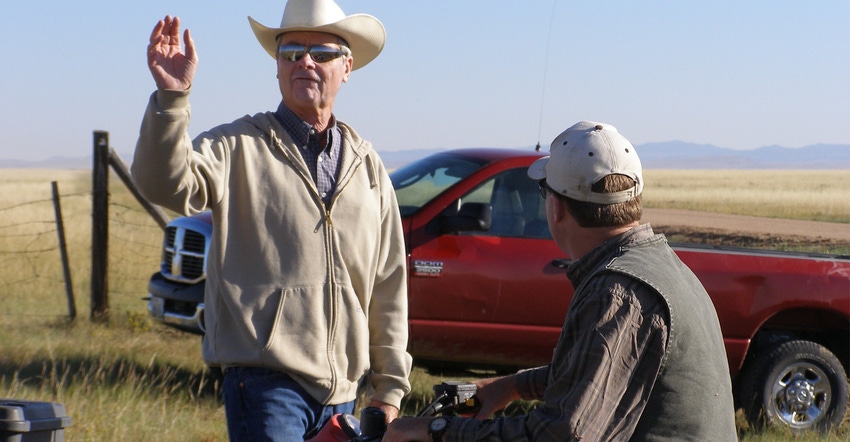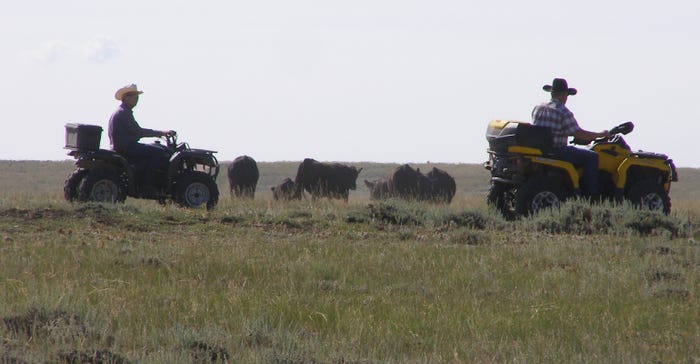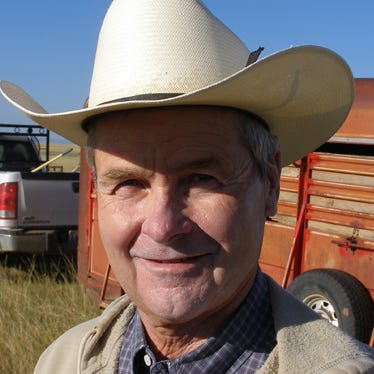June 30, 2017

Feuds continue to divide family ranches and farms across the country, from small outfits to half-million-acre spreads that make national news.
And even when ag families get along, they still face the major issue of transitioning from one generation to the next.
“Any private enterprise that goes on for very long has to deal with intergenerational issues of all kinds,” says Jon Kirkbride, president of Harding & Kirkbride Livestock Co., which operates a large cattle operation in southeast Wyoming. “This might be the single biggest challenge that many small businesses face, from ranches and farms to shoe stores and lumberyards.”

HEADING HOME: Jon Kirkbride (left) and brother Alan trail cattle on the family ranch in southeast Wyoming. They say that teamwork helps hold the operation together.

Like every family business, Harding & Kirkbride Livestock has dealt with intergenerational issues, but emphasis is placed on getting along. And that emphasis, says Kirkbride, has helped the ranch succeed since 1889.
“I’m proud that we’ve been able to keep our family together,” Kirkbride says before a cattle roundup.
Currently, 11 brothers, cousins, sons and nephews from 11 Harding and Kirkbride families are involved in day-to-day operations.
Get more INSIGHT: Download Farm Succession Planning now!
These family members, along with one hired hand, know what work is all about — because they alone run thousands of stockers and 700 cow-calf pairs across many thousands of acres in Laramie, Goshen, Platte, Albany and Carbon counties.
“One of the biggest problems for all ranches and farms is transitioning to the next generation and dealing with the heirs who want to come back, and those who don’t,” Kirkbride says. “You have the issue of kids wanting to come back and there may or may not be a place for them, and you have the issue of kids who don’t want to come back and just want their money out of it.”
Though this wasn’t the motivator to purchase land across such a wide area, the sprawling ranch has given each partner plenty of autonomy.
“Everyone has plenty of space to work, and each partner has an area of responsibility. Everyone calls their own shots in their specific area. We don’t micromanage each other,” Kirkbride says. “And we avoid dickering over small details.”

READY TO RIDE: Smothered with sunscreen, Jon Kirkbride prepares to help gather cattle on his family’s Wyoming ranch. He says his family works hard to get along, which has helped sustain the ranch since 1889.

Building the ranch
Ongoing land purchases have been important for ranch expansion and to allow additional family members a stake in day-to-day operations if they so desire.
“We’re not aggressively looking to get bigger, but we’re always looking for good opportunities,” he notes.
The most recent came in late 2014, when the families bought 400 acres in Goshen County, the most important cattle production county in Wyoming.
“The land complemented what we already had; it was a strategic parcel that gave us better access to some of our other holdings,” Kirkbride says.
The ranch is set up as an S corporation, which allows it to avoid double taxation (to both the corporation and its shareholders). It also has buy-sell agreements to help keep the corporation more closely held, and most working partners have a trust and an estate plan.
“There is a lot of satisfaction of running your own business and being able to look at accomplishments with great pride,” Kirkbride says. “I also enjoy working with my family. It’s a lot like a marriage. Things aren’t perfect all the time, but everyone understands that it takes patience and cooperation to stay together.”
10 tips for working through tough situations
University of Wyoming Extension Educator Blake Hauptman offers the following 10 tips to help work through tough situations on your farm, ranch, or other business:

Blake Hauptman

1. Maintain an open and clear line of communication among family members, employees and others who are part of the operation.
2. Consider establishing a business organizational chart that includes shareholders and a board of directors, and that outlines each person’s roles and responsibilities.
3. Make sure everyone feels heard, including in-laws, employees and off-the-ranch or farm family members.
4. Be open to change, and set up scheduled meetings to work on the business and discuss new ideas.
5. Present your ideas without coming off as condescending, or discrediting how the past generation has managed things.
6. During discussions, listen to understand, not just to compose a response.
7. Recognize that good employees and family members may not be motivated solely by money. They may want to feel invested in the business, have input on management decisions and enjoy life outside the farm or ranch.
8. Refrain from hiring employees or family members only for what they are good at; instead, think what needs to be done to make the ranch or farm more profitable, efficient and sustainable.
9. Don’t shy away from difficult situations (such as estate planning), but confront them in a positive manner before they become bigger issues.
10. Don’t be afraid to ask for outside help to resolve a conflict, but make sure other family members know your intentions.
There are many resources to help family ranches and farms in the Western Farmer-Stockman coverage area, including state mediation programs.
For example, Wyoming farmers and ranchers needing help on such issues as ag family estate planning disputes, ag business disputes, ag credit issues, etc., can contact the Wyoming Agricultural and Natural Resource Mediation Program for assistance.
Waggener writes from Laramie, Wyo.
About the Author(s)
You May Also Like




